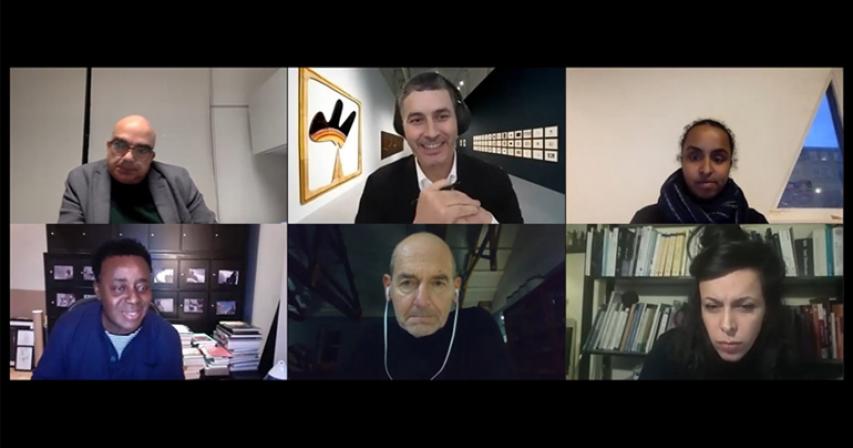The virtual conference held under the theme ‘The Future Museum in the Future City’ saw artists, intellectuals, practitioners and curators come together to explore the future of museums through a series of workshops taking place over the coming months.
The Doha Institute for Graduate Studies (DI) and Mathaf: Arab Museum of Modern Art hosted on Monday, 14 December the first workshop of The Visual Arts Studies Third Annual Conference 2020-21.
The virtual conference, held under the theme The Future Museum in the Future City, saw artists, intellectuals, practitioners and curators come together to explore the future of museums through a series of workshops taking place over the coming months.
Moderating this first workshop and delivering its welcome remarks were Professor Amal Ghazal, Dean of the School of Social Sciences and Humanities, DI; Abdellah Karroum, Director of Mathaf: Arab Museum of Modern Art; and Ismail Nashef, Associate Professor, DI.
During his opening remarks, Karroum, said: “The third edition of this conference is pertinent as it takes place during a transformative moment in the history for both Mathaf and Doha Institute. The current pandemic has accelerated necessary change to the way in which museums and universities operate. In fact, Mathaf has started thinking of multiple ways to engage its audiences, as a large majority of our audiences are non-physical.
“The museum or exhibition experience starts before the actual visit, and the encounter of artistic ideas contributes immensely to the awareness of the world around us.”
When discussing the spatio-temporality of museums, Karroum added: “Museums should serve the art and not the other way round.”
Probing the question on what the future of museums would entail in the ever-changing transformation, Nashef, said: “The question today is how we can effectively restructure the museum amid major transformation? A new regime is unfolding in which our collective psyche is being reshaped by digital technology and market forces. In this context, we need to examine how the emergence of this new regime will affect the museum’s traditional function.”
Panelists that participated in the workshop included artist and filmmaker, John Akomfrah, who brought the concept of civility through ideas of transmutation, transfiguration and fantomic in his intervention entitled The Unintended Beauty of Disaster; curator, Vasif Kortun, who addressed the divided ecology and the possibilities and challenges within cultural institutions of various scales in his intervention: Speaking from the Antechamber: A Generous Institutional Subjectivity; contemporary artist, Noor Abu Arafeh, whose paper On How to Remember: Towards an Immaterial Museum, explored specific examples of art projects redefining space of encounter and display; and curator and researcher, Amal Alhaag, who analysed futurism in art through the conditions of the artist, the curator in displacement and transnational movements in her intervention Speculative Side-Steppers: The Museum Must Not Hold.
The workshop also examined the repercussions of the global pandemic, and how both the city and museum have been deeply impacted and radically transformed as a result of COVID-19.
The workshop, held on Zoom and broadcasted live on social media channels, was an open public forum that concluded with a Q&A session inviting participants to comment on the various topics explored during the session.
A series of workshops and talks will be held throughout The Visual Arts Studies Third Annual Conference 2020-21, taking place until April 2021.

Comments